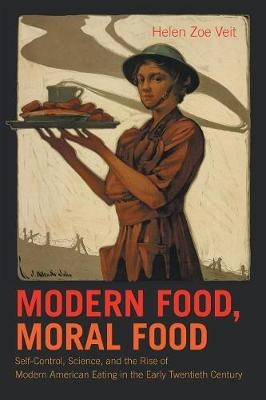
Modern Food, Moral Food
Self-Control, Science, and the Rise of Modern American Eating in the Early Twentieth Century
Seiten
2015
The University of North Carolina Press (Verlag)
978-1-4696-2647-5 (ISBN)
The University of North Carolina Press (Verlag)
978-1-4696-2647-5 (ISBN)
Argues that the twentieth-century food revolution was fuelled by a powerful conviction that Americans had a moral obligation to use self-discipline and reason, rather than taste and tradition, in choosing what to eat. Helen Zoe Veit weaves together cultural history and the history of science to bring readers into the strange and complex world of the American Progressive Era.
American eating changed dramatically in the early twentieth century. As food production became more industrialized, nutritionists, home economists, and so-called racial scientists were all pointing Americans toward a newly scientific approach to diet. Food faddists were rewriting the most basic rules surrounding eating, while reformers were working to reshape the diets of immigrants and the poor. And by the time of World War I, the country's first international aid program was bringing moral advice about food conservation into kitchens around the country. In Modern Food, Moral Food, Helen Zoe Veit argues that the twentieth-century food revolution was fueled by a powerful conviction that Americans had a moral obligation to use self-discipline and reason, rather than taste and tradition, in choosing what to eat.
Veit weaves together cultural history and the history of science to bring readers into the strange and complex world of the American Progressive Era. The era's emphasis on science and self-control left a profound mark on American eating, one that remains today in everything from the ubiquity of science-based dietary advice to the tenacious idealization of thinness.
American eating changed dramatically in the early twentieth century. As food production became more industrialized, nutritionists, home economists, and so-called racial scientists were all pointing Americans toward a newly scientific approach to diet. Food faddists were rewriting the most basic rules surrounding eating, while reformers were working to reshape the diets of immigrants and the poor. And by the time of World War I, the country's first international aid program was bringing moral advice about food conservation into kitchens around the country. In Modern Food, Moral Food, Helen Zoe Veit argues that the twentieth-century food revolution was fueled by a powerful conviction that Americans had a moral obligation to use self-discipline and reason, rather than taste and tradition, in choosing what to eat.
Veit weaves together cultural history and the history of science to bring readers into the strange and complex world of the American Progressive Era. The era's emphasis on science and self-control left a profound mark on American eating, one that remains today in everything from the ubiquity of science-based dietary advice to the tenacious idealization of thinness.
Helen Zoe Veit is assistant professor of history at Michigan State University, USA.
| Erscheint lt. Verlag | 30.8.2015 |
|---|---|
| Zusatzinfo | 10 halftones |
| Verlagsort | Chapel Hill |
| Sprache | englisch |
| Maße | 155 x 235 mm |
| Themenwelt | Geisteswissenschaften ► Geschichte ► Regional- / Ländergeschichte |
| Medizin / Pharmazie ► Gesundheitswesen | |
| Sozialwissenschaften | |
| ISBN-10 | 1-4696-2647-0 / 1469626470 |
| ISBN-13 | 978-1-4696-2647-5 / 9781469626475 |
| Zustand | Neuware |
| Haben Sie eine Frage zum Produkt? |
Mehr entdecken
aus dem Bereich
aus dem Bereich
Erinnerungen
Buch | Softcover (2024)
Pantheon (Verlag)
CHF 22,40
Universalgelehrter, Polarreisender, Entdecker
Buch | Hardcover (2024)
mareverlag
CHF 39,20


